Have found quite an extraordinary broadcast from last year which examines bias on the BBC's coverage of the climategate story less than two weeks into the affair. Essentially the programme suggests there may be a pro-green or pro-climate science bias. This is done by inviting two skeptic activists on to the programme to ask why hasn't the BBC given more skeptical coverage to the story. What is extraordinary is that this was broadcast on December 4th 2009 when few if any facts were known, as shown by this handy Guardian Timeline graphic.
The broadcast reports skeptical activists conspiracy theories at one point even adding words in to the emails to make a completely bogus point. An email is shown saying 'the CRU at Anglia University admit "hiding the the decline" (in global temperatures)' .
For the record the CRU do not admit any such thing and no hacked email says that either. This is an email sent to the BBC and the words in brackets have been added by a skeptic activist . Never let the truth get in the way of a good story! The University of East Anglia explained in late February in it's submission to Parliament exactly what the phrase "hide the decline" means, and it's not anything to do with global temperatures. So aren't the BBC jumping the gun here?
This is a propagandist's trick pretending to bend over backwards at being impartial (which we've seen before) . Rather than report facts, which could prove to be wrong, they are reporting concerns about their own bias , but concerns only from one side. Leaving the audience to conclude that the complainant has been wronged. It is a technique which leaves it's mark not just for what is said but for what is not said, because the clear implication is that there is something being held back. In the context of the timing it's difficult to see what the two skeptics could have complained about. Devoid of any contemporaneous gripe they instead recite the usual litany of (unchallenged) moans about the science and politics . At the time, the one thing that really needed to be established was the facts, instead the BBC gave us skeptic activists complaining not about facts but about their viewpoint .
Could it be that amongst the media frenzy of the first couple of weeks the broadcaster was unable to report any damning evidence from inchoate facts and in danger of falling behind it's competitors in the mainstream media. So a programme was done musing over whether the BBC itself was biased against the skeptics. As I can testify, the examination of bias is not an exact science, so if a broadcaster of the BBCs standing suggests it may itself be biased itself who's to argue?
One final point for now. Richard Black explains at some point about the BBCs impartiality document** which states that skeptics get less than half the 'space' . Yet there are only four people in the studio including the presenter (who is presumably unconvinced either way). Two of those are skeptics. There are no proponents of AGW apart from Black, and no one to defend the scientists at all. So that's 66% of the space going to the skeptics. Here we see the impartiality rules being explained to skeptics whilst ignoring the impartiality rules.
I find the deceipt going on by the commission of this programme to be deeply unsettling. I complain about BBC bias regularly. I have put in countless complaints this year, most of which have been completely ignored by the BBC. Yet here we see skeptic activists getting access to the airwaves only two weeks into the scandal to complain about nothing more than a percieved lack of speculation by the BBC, at a time when the only known fact was that the CRU had been hacked, which was of course a crime against the scientists.
** From SeeSaw to Wagon Wheel page 40
P.S. After many months three enquiries into the hacked emails cleared the scientists. The corresponding Newswatch programmes were broadcast on 9th April, 16th April and finally 10th July. But these programmes do not find time to mention the exoneration of the scientists.
Am working through the rest of the broadcasts. 23rd April is interesting, it's on science in general and contains an interview with Phallab Ghosh and one with the enigmatic Fiona Fox (director of the Science Media Centre and LM Group so she has a foot in both camps). Doesn't mention that the first enquiry was already in by then though.

No comments:
Post a Comment